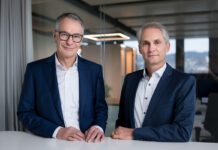
An online learning platform which aims to help researchers working in the earth and biological sciences develop new skills, share knowledge and build experience was launched on 11 October.
The Geosciences Advanced E-Learning Academy, or GAEA, provides postgraduate education providers and the wider research community with a virtual educational space supported by the UK’s NERC Facilities for geoscience.
GAEA was developed by researchers from the Scottish Universities Environmental Research Centre (SUERC) in partnership with colleagues from the National Oceanography Centre, the British Geological Survey, Oxford University, Bristol University and the Centre for Ecology and Hydrology.
It was supported by funding from the Natural Environment Research Council (NERC), part of UK Research and Innovation.
GAEA brings together the facilities across the UK which make up BOSCORF, the UK’s marine sediment repository and research facility, and NEIF, the National Environmental Isotope Facility.
These NERC-funded research facilities use cutting-edge equipment to produce analyses of environmental, archaeological and geological materials, from the oldest materials to modern environmental processes, understanding deep earth processes through to the climate system.
GAEA’s digital training resource is aimed at researchers at all stages of their career and will be accessible to researchers around the world, providing a wide range of material to develop their knowledge of environmental science, technology and new ideas.
A comprehensive course in K-Ar and Ar/Ar geochronology consisting of 60 videos will be available at launch, with courses on cosmogenic nuclide dating, Uranium decay geochronology and stable isotopes to follow.
Each course will provide detailed instruction in recent developments in the field of research, how sampling strategies can be developed, best practice for data sampling, and how data can be interpreted.
By the end of their studies, course users will have developed a clear understanding of geochemical and geochronological analysis, from sample collection to publication. In addition, users can download a certificate of completion for each course as evidence of their training.
GAEA users will also have the chance to interact directly with staff from NERC-funded facilities at regular webinars, as well as each other on dedicated community forums hosted on the website.
More content available to GAEA users includes dedicated skills videos looking at a range of issues which could affect the geoscience researchers, from advice on the legal issues around importing samples to dealing with menstruation while undertaking field work.
A suite of 3D visualisations of each NEIF and BOSCORF laboratory is also available, allowing users to take a detailed tour of each facility either in virtual reality or on their web browser and develop their knowledge of the instrumentation available at each.
Professor Darren Mark, of SUERC and the University of Glasgow, is GAEA’s principal investigator. Professor Mark said: “GAEA is a one-stop shop for researchers to develop their knowledge of the field of geoscience and their understanding of the facilities available at NEIF and BOSCORF.
“It breaks down barriers between NERC Facilities specialists and the research community and provides users with access to a unique repository of learning materials, which they can interact with in their own time and at their own pace. I’m proud of the collective work NEIF and BOSCORF have done to develop GAEA and I’m looking forward to welcoming our first users to the platform from today.”
Dr Millie Bompard, also of SUERC and the University of Glasgow, is GAEA’s project manager. She added: “We’re delighted to be launching GAEA during Earth Science Week after 18 months of work to produce the high-quality content which makes up the site.
“This is an ongoing process, and we will be adding more material in the coming months, as well as new opportunities for users to interact directly with NERC-funded researchers, in order to provide the next generation of scientists working in this field with high-quality continuing professional development opportunities.”
GAEA co-investigator Dr Daniel Condon, part of the NEIF team at the British Geological Survey, said: “Training has always been at the heart of the NERC facilities mission, and GAEA is a major development in how we can deliver this, covering the breadth of applications as well as the depth of the technical expertise, and reaching a much wider audience. It’s going to be exciting to see how this resource grows!”
Dr Suzanne Maclachlan, Head of BOSCORF at National Oceanography Centre, and Co-Investigator on GAEA said: “This is an exciting opportunity to provide training across a wide range of topics in environmental science. The platform will serve as an innovative learning hub for a wide range of geoscience students and researchers whilst providing a crucial link between NEIF and BOSCORF, by hosting key analytical information that is common to both facilities and explores areas of science that crossover.
“The BOSCORF team at the NOC will be creating a marine sediments module, including a cohesive array of information from sediment core types to the intricacies of XRF core scanning. This will provide a wealth of practical assistance as well as specialist knowledge and training.”
GAEA is available online at http://www.gaea.ac.uk







